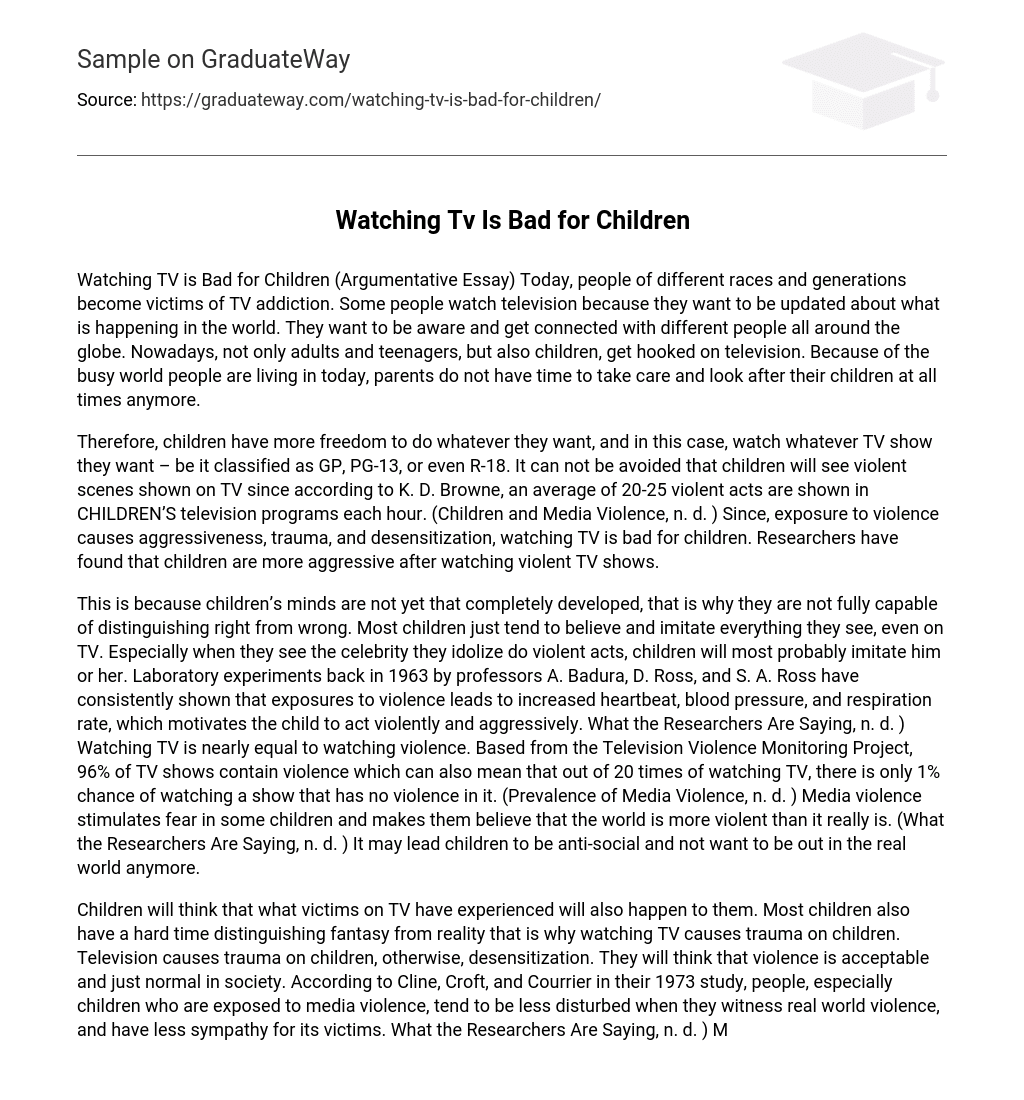Television addiction is a universal problem that impacts individuals of various races and generations. It serves as a means for people to stay informed about worldwide occurrences and establish global connections. Unfortunately, this addictive behavior extends beyond adults and teenagers, affecting children as well. Due to the hectic lives many lead, parents encounter difficulties in providing consistent care and supervision for their children.
Children have the freedom to choose and watch any TV show they want, regardless of their ratings such as GP, PG-13, or even R-18. However, this also means that children are likely to encounter violent scenes while watching television. According to studies mentioned in Children and Media Violence (n.d.), programs targeted at children depict an average of 20-25 acts of violence per hour. The exposure to such violence has negative consequences on children, resulting in increased aggression, trauma, and desensitization. Researchers have found a direct link between watching violent TV shows and heightened levels of aggressiveness among children.
Childhood vulnerability to the influence of violence stems from their underdeveloped minds. They are susceptible to believing and imitating what they witness, especially on television. A. Badura, D. Ross, and S. A. Ross conducted experiments in 1963 that consistently demonstrated the effects of this exposure: children’s heart rate, blood pressure, and respiration rate increase when exposed to violence, leading to aggressive behavior. It is concerning that around 96% of TV shows depict violent scenes; hence, encountering a non-violent show only has a 1% chance out of every 20 shows watched. This prevalence of media violence instills fear in children and distorts their perception of reality as more violent than it actually is, potentially causing them to become anti-social and avoid real-world interactions.
Children may experience trauma when they believe that the events portrayed on television will happen to them. This is because children struggle to distinguish between what is real and what is not while watching TV. Another consequence of children watching television is desensitization, as they may start accepting and normalizing violence in society. A study conducted by Cline, Croft, and Courrier in 1973 found that individuals exposed to media violence, especially children, tend to show reduced distress when witnessing real-world violence and have decreased sympathy towards its victims (What the Researchers Are Saying, n.d.). Moreover, exposure to media violence can cause children to overestimate their risk of becoming crime victims, perceive their community as unsafe, and mistakenly believe that crime rates are increasing even if they are not (What the Researchers Are Saying,n.d.). However, conflicting findings from Gosselin Jacques de Guise and Guy Paquette in 1997 suggest that television viewing does not generate fear but instead contributes to increased happiness and optimism about life (What the Researchers Are Saying,n.d.).In contrast to the belief that television can expand children’s knowledge and expose them to different aspects of life, a study conducted by Professors Singer, Slovak Frierson, and York in 1998 presents an opposing perspective. The research suggests that the duration of daily television viewing is associated with heightened levels of psychological trauma, anxiety, depression, and post-traumatic stress (What the Researchers Are Saying, n.d.). However, it is important to note that television does offer children exposure to diverse cultures and concepts that may not be readily available within their immediate surroundings.
Despite parents’ concerns about certain television content, shows with positive role models can serve as good influences on children (Television and Children, 2009). However, TV can have negative effects on children’s health, behavior, and family life. While it is important for children to be aware of reality, their formative years may not be the best time for this. It is crucial that they have the ability to make informed decisions. Additionally, there are alternatives to television that can provide children with awareness and knowledge. Books and other reading materials are particularly effective sources for their development.
In present-day television programming, violence is often portrayed and cannot be completely avoided in programs. As a result, watching television becomes harmful to children as it fosters aggressiveness, trauma, and desensitization. Although television can have positive effects on children, the likelihood of negative consequences is higher. Television has the potential to negatively impact various aspects of children’s lives including academic performance,lifestyle choices,career prospects,family relationships,and even their future outcomes.Take a moment to reflect if this is something you want to happen.





